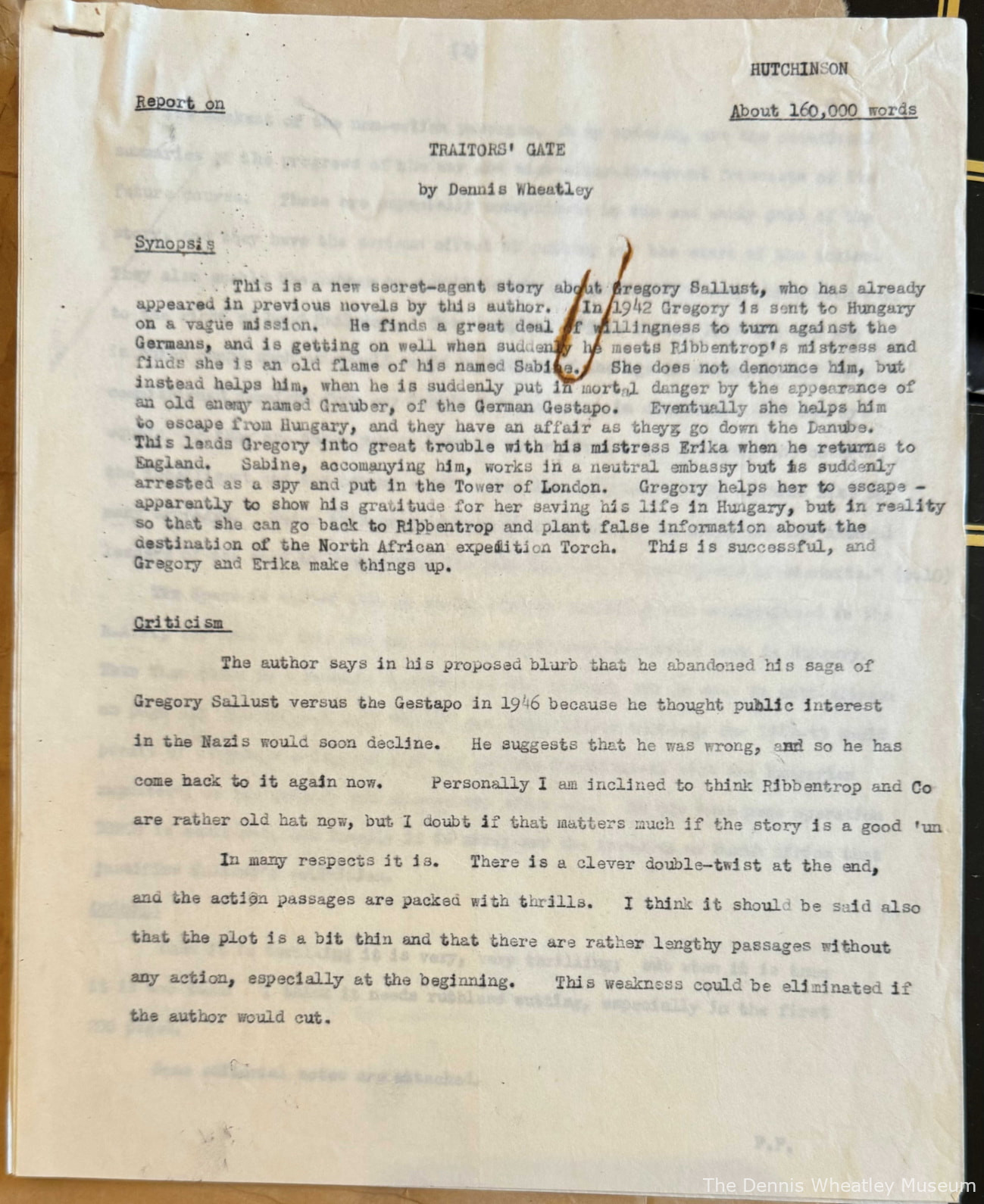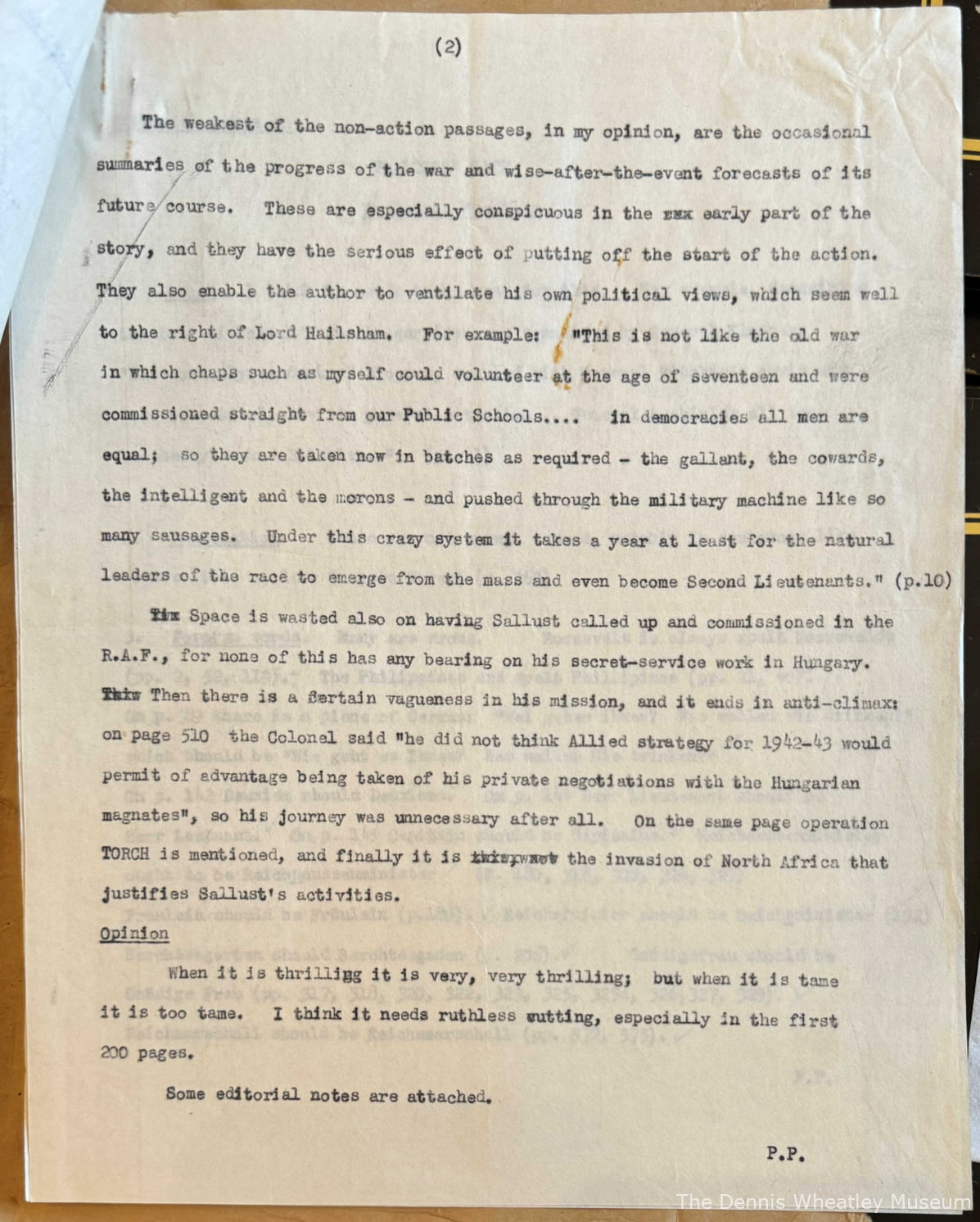
 |
Floor Plan |  |
The Dennis Wheatley 'Museum' - Dennis Wheatley’s Writing Technique
Hutchinson commission Reader's Reports
Even when DW was a bestselling author, once they had been sent a typescript, Hutchinson would commission a Reader's Report, and when they received the report back, they would send a copy to DW.
Whether DW took any notice of this professional feedback is unclear. He certainly seems to have ignored a lot of the suggestions, and as he was Hutchinson's money-spinner, one imagines they did not dwell too much on his recalcitrance. After all, they would certainly not have wanted to lose him.
As the examples show, while many of the comments are interesting, there are some which DW may have considered (especially as they came from people who were not successful writers) to border on the offensive. There are certainly some which modern day DW enthusiasts would take issue with.
Reader's comments include the following:
On 'The Haunting of Toby Jugg':
'Dennis Wheatley writes so brilliantly that it is difficult for the reader to keep control of his critical faculties. There is a power about the style of this book that makes it a sheer joy to read, and only out of a sense of duty will the reader force himself to pause now and then to apply canons of conventional criticism.'
Apart from the style, the novel has two great merits. In the first place it is a superb story, with fine characterization and constructed with artistry and craftsmanship. Secondly, Mr. Wheatley has succeeded in creating an eerie atmosphere of the occult that makes the most materialistic flesh creep. In another writer's hands, the Satanism of Helmuth would seem fantastic and unreal; here it is made uncomfortably lifelike and credible.'
and
'The reader will, of course, enjoy this book primarily for the story, secondarily for the occult atmosphere, and for the political propaganda will care hardly at all.'
'...The book is long, and I think it would be improved if some of the "general discussion" passages were cut out. But I must admit that - thanks to his brilliant construction - the author has kept up (and steadily increased) the suspense throughout the 550 pages of manuscript.'
'...I should like to draw attention to what might possibly be considered an unintentional libel...
On 'The Rape of Venice':
'...I seriously believe that some cutting, not solely for questions of length, would benefit the MS.'
and
'...It is made very clear that the author's sympathies are strongly Tory, and even more anti-Whig.'
On 'The Sultan's Daughter':
'Mr. Wheatley is inclined to give the reader information about his characters in the form of lengthy dialogue in which the characters recapitulate events well-known to them both. This gives a most unnatural impression and is very tedious to read about. I think large passages should be cut...'
and
'Successful as Mr. Wheatley is, he is allowed to be lengthy and his readers have no doubt come to expect it. But I still feel that this particular book could be reduced with benefit.'
On 'They Used Dark Forces':
'I thus sent proofs to our lawyers.'
[Hutchinson's were fearful that DW might have committed libel in his criticism of the military strategies adopted by some of the Allies' 'High Ups'.]
'Sir Pellinore is not the happiest of Mr. Wheatley's creations, and the less he says the better'
On 'The Wanton Princess':
'...although the characterisation is far from profound it is agreeably consistent'
'...There is a tendency for his research to lie on the surface in undigested lumps...'
On 'Gateway to Hell':
'Accept. Up to Mr. Wheatley's usual standard.'
Note 1: The fact that there are Reader's Reports in the manuscript packs seems hard to square with the story of Giles Gordon sending one of DW's novels to a reader and being ticked off by Robert Lusty for not sending it straight to the printer. One cannot help but wonder if perhaps Gordon made the story up.
| References: | On Giles Gordon and the Reader's Report, Phil Baker pp 544-546 |
| Provenance: | Private Collection |



